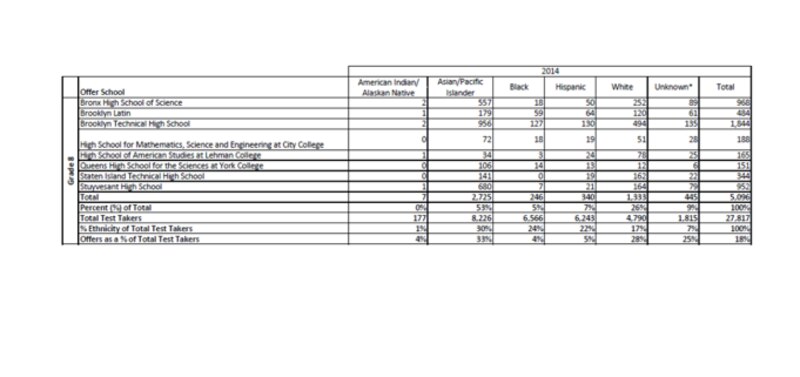Few black and Hispanic students won seats in eight of the city’s specialized high schools this year, prompting Mayor Bill de Blasio to repeat a campaign trail declaration that the admissions process needs an overhaul.
Just 11 percent of the offers to eight of the city’s top high schools went to black and Hispanic students, though they make up about 70 percent of the city’s eighth graders. That figure is similar to last year’s, though for some schools the number of offers to black and Hispanic students continued to fall. Just seven of 952 students accepted to Stuyvesant High School are black, and 21 are Hispanic. No black students were admitted to Staten Island Tech, down from five last year.
Students get those admissions offers based solely on their performance on the Specialized High School Admissions Test. Civil rights groups and de Blasio himself have said that process contributes to inequity, since lower-income families have less access to high-quality elementary and middle schools or external test preparation,
On Tuesday, the mayor and Chancellor Carmen Fariña signaled that they would be revisiting the admissions requirements—though their time frame isn’t soon enough for some.
“Over time we’re going to have a series of steps we take,” de Blasio said. “I think ultimately we need to reform the admissions system. That’s something we’d have to do with Albany.”
That’s partially true, since three of the eight specialized schools that use the exam have their admissions rules codified in state law. But the mayor could change admissions rules for the other five, including Staten Island Tech, to include other measures like student grades at any time.
Fariña said in a statement that the department will be looking into the admissions gap “in the coming months.”
Their statements represented an official shift from former Mayor Michael Bloomberg, who repeatedly said that the admissions process was an equitable one because all students were judged by the same criteria.
“You pass the test, you get the highest score, you get into the school — no matter what your ethnicity, no matter what your economic background is. That’s been the tradition in these schools since they were founded, and it’s going to continue to be,” Bloomberg said in 2012.
To Lazar Treschan, the director of youth policy at the Community Service Society of New York, today’s numbers were just the latest confirmation that the admissions process needs to reflect more than a test.
“Zero [black students] at Staten Island Tech and three at Lehman? It’s not like there are no black students in Staten Island and the Bronx,” Treschan said, referring to the High School of American Studies at Lehman College, which is not required by law to use the Standardized High School Admissions Test for admission. “It’s academic apartheid.”
Treschan co-authored a report last year with the the NAACP Legal Defense Fund that laid out options for a “fairer and more effective” process for determining who gets the city’s most-coveted high school seats. The report points out that most of the nation’s highest performing, selective high schools already use more than one measure to determine admission.
The NAACP Legal Defense Fund also filed a civil rights complaint about the specialized high school admissions process in 2012. Lawyer Monique Lin-Luse, special counsel to the education group at the Legal Defense Fund, said the U.S. Department of Education Office of Civil Rights is still investigating that claim.
The civil rights complaint is one of three fronts on which the group is fighting to change the admissions policy, Lin-Luse said, including state legislation and lobbying City Hall to change the procedure for the five schools in their control as soon as possible.
“There is a sense of urgency that decisions need to be made so so that students can prepare,” Lin-Luse said. “We shouldn’t wait another year.”
The state legislation would allow city officials to determine the admissions criteria for Stuyvesant, Brooklyn Tech, and Bronx Science. State Assemblyman Karim Camara sponsored the bill in the Assembly, where it has stalled for the last two years. But Camara said today that he’s hopeful that de Blasio’s support could help push a more ambitious, amended version through the legislature.
“Over the next few weeks we will be announcing a very specific piece of legislation,” Camara said. “What we have now is a plan that we’re developing that would lay out the measures, from expanding the pool of applicants to having more notification to children of color.”
The Department of Education also announced the results of its regular high school admissions process today, and officials said that 45 percent of eighth graders who applied got into their first-choice school—down slightly from 47 percent last year. 73 percent of applicants got into one of their top three choices.
10 percent of the applicants didn’t receive a high school match and will need to go through round two, when they can rank schools that still have available seats and apply to a group of newly announced schools.

